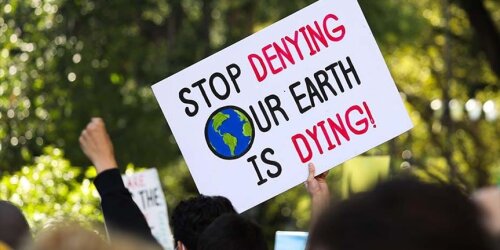When people took to the streets in Egypt in 2011, protesters chanted about freedom and social justice — but also bread. The cost of pantry staples had jumped because of the skyrocketing price of goods like wheat, stoking fury with President Hosni Mubarak.
Now, more than a decade after the Arab Spring, global food prices are soaring again. They had already reached their highest level on record earlier this year as the pandemic, poor weather and the climate crisis upended agriculture and threatened food security for millions of people. Then came Russia's war in Ukraine, making the situation much worse — while also triggering a spike in the cost of the other daily essential, fuel.
The combination could generate a wave of political instability, as people who were already frustrated with government leaders are pushed over the edge by rising costs.
"It is extremely worrisome," said Rabah Arezki, a senior fellow at Harvard's Kennedy School of Government and former chief economist at the African Development Bank.
Unrest in Sri Lanka, Pakistan and Peru over the past week highlights the risks. In Sri Lanka, protests have erupted over shortages of gas and other basic goods. Double-digit inflation in Pakistan has eroded support for Prime Minister Imran Khan, forcing him from office. At least six people have died in recent anti-government protests in Peru sparked by rising fuel prices. But political conflict isn't expected to be limited to these countries.
"I don't think people have felt the full impact of rising prices just yet," said Hamish Kinnear, a Middle East and North Africa analyst at Verisk Maplecroft, a global risk consultancy.
In Sri Lanka, an island nation of 22 million, an economic and political crisis is already boiling over, with protesters taking to the streets in defiance of curfews and government ministers stepping down en masse.
Pakistan's parliament issued a vote of no confidence in Khan on Sunday, ousting him from power and upending his government. While his political problems date back years, claims of economic mismanagement as the cost of food and fuel leaped, as well as the depletion of foreign exchange reserves, made matters worse.
Egypt, the world's largest buyer of wheat, is already seeing enormous pressure on its huge subsidy program for bread. The country recently set a fixed price for unsubsidized bread after prices spiked, and is trying to secure wheat imports from countries like India and Argentina instead.
Droughts and conflict in countries like Ethiopia, Somalia, South Sudan and Burkina Faso have created a food security crisis for more than a quarter of the continent's population, the International Committee of the Red Cross said this week. The situation risks getting worse in the coming months.
News ID : 493
 5 Things About Money That Banks Hide from You
Bussiness / Opinion
5 Things About Money That Banks Hide from You
Bussiness / Opinion
 Chinese consumers selling Rolex watches & Hermes bags to raise quick cash
Bussiness
Chinese consumers selling Rolex watches & Hermes bags to raise quick cash
Bussiness
 Oil prices fall due to concerns about demand in China
Bussiness / Breaking News
Oil prices fall due to concerns about demand in China
Bussiness / Breaking News
 UN: Developing countries face years of difficulty as global economy slows
Bussiness / Breaking News
UN: Developing countries face years of difficulty as global economy slows
Bussiness / Breaking News
 Renault suspends its activities in Moscow
Bussiness
Renault suspends its activities in Moscow
Bussiness
 Global climate strikes, environmental protests in 2021
World
Global climate strikes, environmental protests in 2021
World
 Despite Biden's vows, Yemen starves
Human Rights
Despite Biden's vows, Yemen starves
Human Rights
 How the FAA went to war against 5G
Technology
How the FAA went to war against 5G
Technology
 What the US could learn from China's nuclear power expansion
Technology
What the US could learn from China's nuclear power expansion
Technology
 Why NATO cannot escape the blame what is unfolding in Ukraine?
World / Opinion
Why NATO cannot escape the blame what is unfolding in Ukraine?
World / Opinion